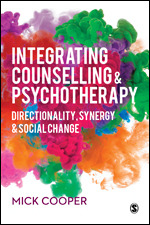Integrating Counselling & Psychotherapy
Directionality, Synergy and Social Change
- Mick Cooper - University of Roehampton, UK
How can therapists integrate theories and practices from across the psychological therapies?
This book presents a framework for understanding distress and change that can unite different orientations, along with sociopolitical perspectives.
Its starting point is that therapy aims to help clients move towards the things they most deeply want. It shows how the actualisation of these ‘directions’ leads to greater well-being, and how this can be brought about through the development of internal and external synergies.
Using in-depth cases, the book provides detailed guidance on how this framework can be applied. After reading this book, you’ll feel better equipped to understand, and work with, your clients’ directions—tailoring the therapy to their unique wants.
Supplements
https://study.sagepub.com/counselling/resources/cooper-integrating-counselling-psychotherapy
Mick’s new book is a treasure chest of information. This gem is valuable reading for all levels of experience. It is for anyone looking to advance knowledge, as well as refine their integrative style. It is a solid and insightful read.
What a fabulous book!
Cooper effortlessly weaves together the complementary strands of philosophy, psychology, psychotherapy and sociology to tell the story that psychological distress is the undermining of control, purpose and self-actualisation by chronic conflict that occurs both between and within individuals. His even-handed approach to psychodynamic, humanistic and cognitive-behavioural approaches is both a political masterstroke and a genuine indication of the respect he has for each of their benefits. Not since the great Klaus Grawe have I read such a wide-reaching and scientifically grounded account of psychological distress and therapeutic recovery.
This book is an exciting and ambitious attempt at theoretical integration in psychotherapy focused on the concept of directionality: ‘a forward moving and active quality of human being’. Mick Cooper’s easy narrative style gives clarity to the complex material, as he navigates psychological theories and techniques, and gives guidance for practice. His clarity, originality and the wealth of material make this book interesting and useful to both experienced and novice psychotherapists, and an invaluable resource for the pluralistic practice.
A practical, insightful guide which offers a fresh take on integration that successfully manages to transcend unhelpful ‘schoolism’.
Mick Cooper offers a new vision of therapeutic integration in which directionality - the forward-moving, active quality of being human – is the unifying principle between different therapeutic orientations and the wider socio-political field …in the search to help clients achieve their goals.
Cooper’s work is erudite, informative and engaging. There is something new to learn, and reflect on, on almost every page. It sets a new standard for integrative thinking and practice.
Mick Cooper takes integration to innovative and thought-provoking levels in his latest textbook. Blending his personal and professional realms, Cooper sets out concepts to advance integrative theory and practice. His conceptualisation of ‘directionality’ is richly articulated through intimate and intricate, clinical and theoretical constructions. His frequent use of case vignettes and personal examples grounds his complex proposal.
This ambitious and encyclopaedic text is an invaluable resource and reference book for a wide range of practitioners in the counselling professions including: counsellors, clinical and counselling psychologists, psychotherapists, trainers, supervisors and researchers. Additionally, it should be essential reading for students on integrative training courses.
Cooper poignantly states “we cannot not propel ourselves forward in our lives, even if it is against the tide of time or change.” This chimes with contemporary social contexts; alas epitomising a political landscape lacking the very thing Cooper eloquently argues for: directionality.
This excellent book takes Mick Cooper’s ideas about the relationship between theory and practice a significant step forward.
By placing the human striving for meaning and purpose centre stage he integrates the political dimension that has been lacking in most therapeutic discourse.
This rich book offers diverse insights into concepts underpinning counselling and therapy.
Even if you don’t agree with the suggested integrative framework, this work contributes to a crucial conversation in relation to what good looks like for mental health support.
Bound for the reading list of any higher education course relating to the psyche, Cooper’s ability to cover so much in 250 pages is impressive....This feels like a work of great respect, to examine the principles mushrooming in an increasingly busy and tetchy field, to remind us that resources are ours to use, to tailor to the person before us, as we attempt to witness, reflect and even assist.






